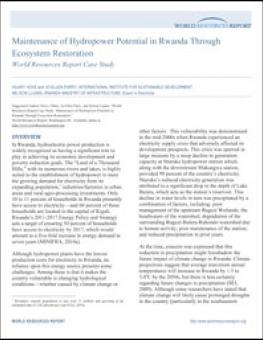
Maintenance of Hydropower Potential in Rwanda Through Ecosystem Restoration
Secure energy access through hydroelectric power production is critical to Rwanda's efforts to achieve its economic development and poverty reduction goals.
However, the country's reliance on hydropower production also leaves it vulnerable to changing hydrological conditions potentially caused by a variety of factors. This vulnerability was demonstrated in the mid-2000s when Rwanda experienced an energy crisis that adversely affected its development prospects. This crisis was spurred in large measure by a steep decline in reservoir water levels at two of the country's largest hydropower stations, leading to a significant drop in electricity production. This decline in water levels was precipitated by a combination of factors, including poor management of an upstream wetland, degradation of the surrounding watershed due to human activity, poor maintenance of the station and reduced precipitation in the preceding years.
In response to this crisis, the Government of Rwanda sought to restore the degraded watershed through a combination of actions at the policy and field levels. It also spurred Rwanda to diversify its energy portfolio with support from the private sector. This case study discusses the actions that were taken and their impact on rural livelihoods and the sustainability of the country's electricity sector. It demonstrates the need for diverse approaches to addressing complex problems and, in particular, the importance of integrated watershed management in promoting energy security and helping to reduce vulnerability to future climate change.
The case study Maintenance of Hydropower Potential in Rwanda Through Ecosystem Restoration was prepared for and published in the 2010-2011 World Resources Report.
Participating experts
You might also be interested in
December 2024 | Carbon Minefields Oil and Gas Exploration Monitor
In November 2024, 23 oil and gas exploration licences were awarded across five countries, with Russia granting the licences that account for the largest portion of embodied emissions.
The Cost of Fossil Fuel Reliance
Government support for fossil fuels reached at least USD 1.5 trillion in 2023, new data shows.
Increased Support Needed to Achieve India's Clean Energy Goals
India is on track to achieve many of its 2030 clean energy goals but needs to step up government support measures to accelerate the deployment of offshore wind, electric vehicles, and green hydrogen, according to a new report.
Budgeting for Net Zero
This study estimates the cost gap for battery energy storage systems (BESSs), offshore wind, solar photovoltaic (PV), electric vehicles (EVs), and green hydrogen (GH2) to inform government support.